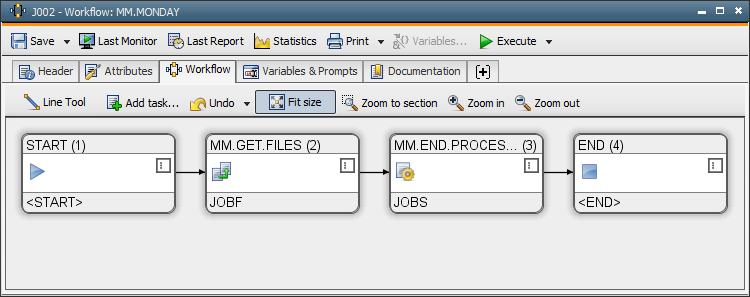
|
:JCL_SUBSTITUTE |

Script Structure and Processing |
:PUBLISH |

|
Script statement: Assigns a value to an object variable.
:PSET Object variable = Value
|
Syntax |
Description/Format |
|---|---|
|
Object variable |
Name of an object variable (starting with the character "&") that should be supplied with a value. A script variable's name for the :PSET and :RSET script statements is limited to 31 alphanumeric characters (in most other cases script variable names are limited to 32 characters), including the special characters "$", "_", "@", "§" and "#". German Umlauts are not allowed. The first character must not be a number. Variables within the script must always specified with a leading "&" following the variable name! Format: script variable |
|
Value |
Value that should be assigned to the object variable. |
Object variables are stored in the Variables & Prompts tabs of objects.
The workflow containing the job, where :PSET is used, is called processor or parent.
Below are the individual steps of :PSET:
The modified value only applies for the execution of tasks. It is not permanently stored in the object itself.
The value of the script variable that is set with :PSET are now only be passed on to the next workflow one level above (parent) but not to the top workflow (such as grandparents or great-grandparents etc.).
The value of the script variable that is set with :PSET will never be passed on to a Schedule or Period Container.
The setting "Generate at runtime" greatly affects objects. Subsequent modifications in object variables do not affect the script if it has already been generated.
Note that object variables are not always passed on to tasks. You can define in each object if values can be inherited and which of them should be inherited from the superordinate task.
In nested workflows, :PSET does not pass on object variables. These are only replaced or added in the particular workflow which contains the task the script statement :PSET addresses.
Note that inherited object variables that have not been defined in the task itself are only available as long as the task is shown in the Activity Window. If restarted, the job as shown in the example below can only access the object variable &HOST# if file transfer plus workflow are still available in the Activity Window.
On the other hand will canceling of the job in a parent (the workflow containing the job, for example) directly cancel the job itself. The parent-child-relationship directly affects the job.
A workflow contains the two objects "MM.GET.FILES" and "MM.END.PROCESSING". The setting "Generate at runtime" has been specified in both objects in order to ensure that their scripts are only generated when it is their turn.

The file transfer checks the environment and changes the object variable &HOST# if required.
:PSET &HOST# = "unix01"
See also:
| Script element | Description |
|---|---|
|
Assigns a value to a script variable and stores it in the activation report. |
|
|
Assigns a value to a script variable. |
|
|
Sets the values of script variables indirectly. |
Script Elements - Script Structure and Processing
About Scripts
Script Elements - Alphabetical Listing
Script Elements - Ordered by Function